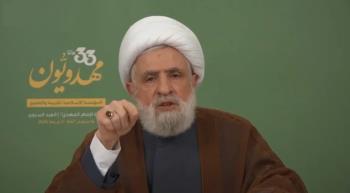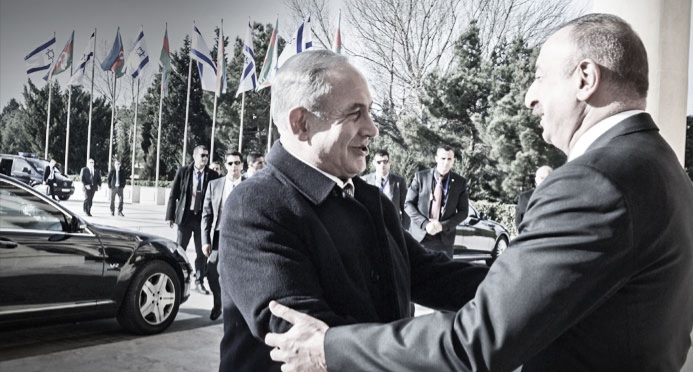Alwaght- Last Friday, Azerbaijan parliament approved opening an embassy in the Israeli regime, taking a long step towards full normalization. The move marked a great achievement for the Israelis in showing that a domino of normalization is brewing in the Muslim countries, especially as the decision means opening an embassy for the first time by a Muslim Shiite-majority country in the occupied Palestinian territories.
In April, Israeli President Issac Herzog called for Azerbaijan to open an embassy in the occupied territories to pave the way for closer and even strategic relations between Baku and Tel Aviv. On October 3, Israeli Defense Minister Benny Gantz flew to Azerbaijan, sparking speculations about Azerbaijani President Ilham Aliyev’s possible controversial move in relations to the Israelis.
The Baku embassy will be located in Tel Aviv, where Azerbaijan already has tourism and trade offices. The Israeli regime and Azerbaijan have been in a relationship for 30 years, and since 1993, the Israelis had their embassy in Baku.
Over the past years, it has been important for Azerbaijan to use the Jewish lobby at the international level to isolate the Armenian lobby concerning Karabakh dispute. Aware of the influence of Jewish groups in the US and their lobby for a longtime, Azerbaijan leaders put one of the foundations of their foreign policy on the basis of being as close as possible to the Jews. Indeed, the type of hypocritical approach of the Israelis towards Azerbaijan and Armenia should not be disregarded in increasing the Azerbaijanis’ thirst to open an embassy in Tel Aviv. At a time when the tensions and then war between the two neighbors escalated, Israel established intelligence and security cooperation with Armenia, and Yerevan opened its embassy in Tel Aviv to distance the latter from Baku . This was while Azerbaijan still did not have an embassy in Israel.
Israel and Azerbaijan have close defense ties. Tel Aviv supplied Baku with combat and reconnaissance drones used during the war over the disputed Karabakh region.
According to the Stockholm International Peace Research Institute (SIPRI), 69 percent of Azerbaijan arms imports from 2016 to 2020 were from Israel, which account for 17 percent of the Israeli arms exports. According to Iran's Fars News Agency (FNA), about 40 percent of Israeli oil comes from Azerbaijan.
Illegitimate decision to open embassy
The intriguing point is that Aliyev, who has been in power since 2003 and utilized the parliament to paint as democratic his absolute rule, chose the parliament to announce opening the embassy in Tel Aviv— a move meant to claim that the controversial decision has people and elite support and is, thus, legitimate. Actually, by doing so, the president put the responsibility on the shoulder of the lawmakers and the society.
Aliyev government has always been accused of holding engineered and unfree elections. The ruling New Azerbaijan Party, led by Aliyev, has always held the majority in the parliament. In a closed political atmosphere, firstly, people have no power to oppose the government policies and secondly, with a submissive parliament, Aliyev finds his hands open to advance his policies.
Protests by people and opposition parties at untransparent elections have always made part of the atmosphere in which presidential and parliamentary elections in Azerbaijan are held in the past two decades. In October 2013, protesters in Baku demanded the cancellation of the election results and the resignation of Aliyev— a demand that had been made in 2003 and 2008. The Azeri authorities have not allowed any protests or opposition gatherings since the controversial presidential election in 2003, which many international observers declared fraudulent. After the election, dozens of opposition activists were imprisoned and even tortured.
During the 2018 presidential election, the Office for Democratic Institutions and Human Rights of the Organization for Security and Cooperation in Europe (ODIHR) announced that it had no choice but to suspend its monitoring mission in Azerbaijan due to restrictions imposed by the Buku authorities.
Aliyev critics say that Baku officials seek to silence the opposition under false accusations by detaining the journalists and rights activists.
Over the past 12 years, Azerbaijani leaders have made more than 200 amendments to their election law. One of the recent changes was the drastic reduction of the election campaign period from four months to 22 days. The government has also severely restricted the places where candidates can meet with voters and the places where citizens can campaign.
These restrictions have encouraged election boycotts by opposition groups including the Modern Musavat Party and Popular Front Party in 2018 and 2020.
Recently, the draft of the new election law was approved in the parliament, which imposes more restrictions on the opposition parties. The new law requires new parties to have at least 200 founding members, each of whom has lived in Azerbaijan continuously for the past 20 years, though the constitution of Azerbaijan requires the presidential candidate to have lived in the country for only 10 years. Also, not participating in two consecutive elections - presidential, parliamentary, or local elections - will be banned.
Addressing these restrictions, Ali Karimli, the head of largest opposition party Popular Front Party, said that it is the direct order from Aliyev that establishes mechanism to cancel, suspend, and unregister the real opposition parties.
Currently, 85 parties are officially registered in Azerbaijan, but the political scene is absolutely under the control of the ruling New Azerbaijan Party.
Alternative Party’s former head Azer Gasimli holds that the new restrictions suggest that Aliyev thinks that he lost his control. Aliyev knows that Azerbaijan, along with Belarus, is the most ready countries for changes in post-Soviet atmosphere
“That is why he is trying to disappoint us. Even though Elham Aliyev calls himself victorious supreme commander, he seems very worried,” Gasimli said referring to the title used by state-run media for Aliyev after winning the 2020 war over Armenia.
Leila Alieva, an affiliate researcher at Oxford School of Global and Area Studies, maintains that like always, the government is afraid of street protests because it sees them carrying a potential revolution. “The protesters are the new elites, youths, and the educated people.
As a result, a majority of the parties, including Modern Musavat Party and the National Council of Democratic Forces, have decided to boycott the next election.
Azerbaijan currently scores 6.75 on a scale of 1 to 7 for press freedom, political freedoms and democracy – not far from 7 as the worst possible score.
Over 80 of the members of civil organizations, media, religious groups, and opposition movements are currently in prison under false pretenses, while other figures either live in exile or limit their activities to avoid imprisonment.
On the other hand, pursuing Western growth models especially in economy and urban development, expansion of Wahhabism and Bahaism, and most importantly the government crackdown on religiosity of people and iron-clad suppression of any social and political movements deriving from the heart of the society with emphasis on Shiite Islam are factors that have brought the country's social and political conditions to the brink of massive changes.
It is noteworthy that Azerbaijan authorities are tolerant of growth of Christianism, Buddhism, Bahaism, and Wahhabism, and other faiths, but at the same time clamp down on Muslims and isolate them and turn them into a minority.
Given the conditions the Muslims are facing in Azerbaijan, the pro-justice and freedom movements seeking a life based on the Shiite faith standards and Islamic rule have already grown, posing a big future challenge to further Aliyev government's closeness to the Israelis.



























